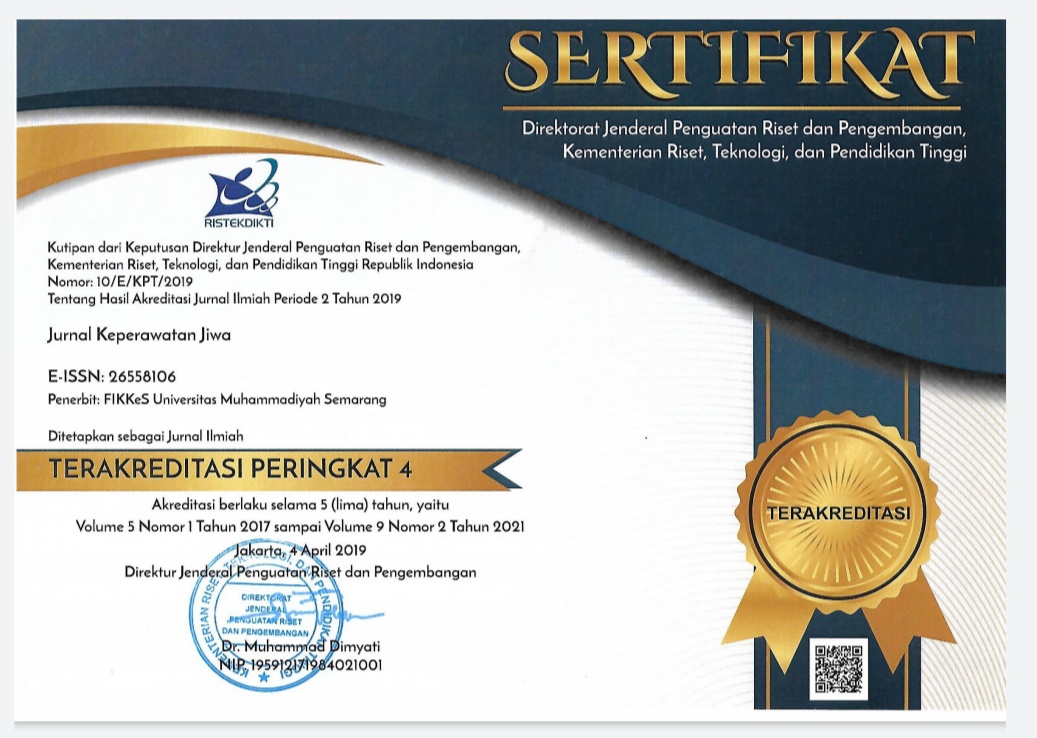Pengaruh Psikodrama terhadap Peningkatan Perilaku Kepatuhan Protocol Kesehatan Covid-19 Pasien Schizophrenia
(1) Program Studi Ilmu Keperawatan, Fakultas Ilmu Kesehatan, Universitas Muhammadiyah Malang
(2) Program Studi Ilmu Keperawatan, Fakultas Ilmu Kesehatan, Universitas Muhammadiyah Malang
(*) Corresponding Author
Abstract
Pasien schizophrenia yang memiliki insight yang buruk, kemampuan kognitif yang lemah, dan perilaku maladapative harus mendapatkan treatment untuk tetap patuh terhadap protocol kesehatan agar tidak tertular Covid-19. Tujuan dari penelitian ini adalah untuk mengetahui pengaruh dan perbedaan latihan psikodrama 4 sesi terhadap perilaku patuh protocol kesehatan covid-19 pada pasien schizophrenia di Panti Rehabilitasi Psikiatrik. Metode dalam penelitian ini menggunakan design Quasi Eksperimen, pretest-postest control group design, prosedur pengumpalan data dilakukan dengan menggunakan kuisioner Adherence to COVID-19 Prevention, analisa data menggunakan uji Wilxocon dan Mann-Whiteney dengan jumlah sampel sebesar 41 kelompok perlakuan dan 41 kelompok kontrol, peneliti juga menggunakan kriteria inklusi yaitu pasien tidak dalam fase krisis, arus pikir koheren, serta kooperatif. Hasil penelitian dengan Uji Mann-Whiteney menunjukkan bahwa terdapat perbedaan antara kelompok yang mendapat perlakuan psikodrama 4 sesi dengan kelompok kontrol yaitu dengan hasil nilai p-value 0.00 (<0.05), Sedangkan dengan uji Wilcoxon menunjukkan terdapat pengaruh penggunaan terapi psikodrama terhadap kepatuhan protocol kesehatan covid-19 pasien schizophrenia dengan nilai p-value 0.00 (<0.05). Terapi psikodrama yang telah dilakukan memiliki kelebihan yaitu partisipan dapat melakukan penyesuaian apabila tidak sesuai dengan naskah drama.
Keywords
Full Text:
PDFReferences
Ahmed, M. Z., Ahmed, O., Aibao, Z., Hanbin, S., Siyu, L., & Ahmad, A. (2020). Epidemic of COVID-19 in China and associated Psychological Problems. Asian Journal of Psychiatry, 51, 102092. https://doi.org/10.1016/j.ajp.2020.102092
Bora, E. (2017). Relationship between insight and theory of mind in schizophrenia: A meta-analysis. Schizophrenia Research, 190, 11–17. https://doi.org/10.1016/j.schres.2017.03.029
Bradley, C. L., & Marcia, J. E. (1998). Generativity-Stagnation: A Five-Category Model. Journal of Personality, 66(1), 39–64. https://doi.org/10.1111/1467-6494.00002
Corey, G. (2011). Theory and Practice of Group Counseling (8th edition). Brooks Cole.
Dzisi, E. K. J., & Dei, O. A. (2020). Adherence to social distancing and wearing of masks within public transportation during the COVID 19 pandemic. Transportation Research Interdisciplinary Perspectives, 7, 100191. https://doi.org/10.1016/j.trip.2020.100191
Iqbal, M. A., & Younas, M. Z. (2021). Public knowledge, attitudes, and practices towards COVID-19 in Pakistan: A cross-sectional study. Children and Youth Services Review, 120, 105784. https://doi.org/10.1016/j.childyouth.2020.105784
Kipper, D. A., & Ritchie, T. D. (2003). The effectiveness of psychodramatic techniques: A meta-analysis. Group Dynamics: Theory, Research, and Practice, 7(1), 13–25. https://doi.org/10.1037/1089-2699.7.1.13
Moreno, J. L. (2009). Scrieri fundamentale despre psihodrama, metoda de grup si spontaneitate. Editura Trei.
Mortan Sevi, O., Ger, M. C., Kaya, F., & Maşalı, B. (2020). The effect of psychodrama sessions on psychotic symptoms, depression, quality of life, and sociometric measures in patients with chronic schizophrenia. The Arts in Psychotherapy, 71, 101719. https://doi.org/10.1016/j.aip.2020.101719
Moschopoulos, N., Nimatoudis, I., Kaprinis, S., Sidiras, C., & Iliadou, V. (2020). Auditory processing disorder may be present in schizophrenia and it is highly correlated with formal thought disorder. Psychiatry Research, 291, 113222. https://doi.org/10.1016/j.psychres.2020.113222
Nugroho, I. P., Kurniawan, M. W., Anggia, R. D., Safira, A., & Rezkyandar, M. (2020). GAMBARAN LITERASI KESEHATAN MENTAL ANAK JALANAN DITINJAU DARI TINGKAT PENDIDIKAN. Prosiding National Simposium & Conference Ahlimedia, 1(1), 1–7. https://doi.org/10.47387/nasca.v1i1.1
Ruddy, R., & Dent-Brown, K. (2007). Drama therapy for schizophrenia or schizophrenia-like illnesses. Cochrane Database of Systematic Reviews. https://doi.org/10.1002/14651858.CD005378.pub2
Spencer, H. M., Dudley, R., Freeston, M. H., & Turkington, D. (2020). What are the essential ingredients of a CBT case conceptualization for voices and delusions in schizophrenia spectrum disorders? A study of expert consensus. Schizophrenia Research, 224, 74–81. https://doi.org/10.1016/j.schres.2020.09.026
Darmawani, E. (2017). Psikodrama Satu Teknik Konseling Traumatik Dalam Suasana Kelompok. PROCEEDING IAIN Batusangkar, 1(1), 93–99.
Pramono, A. (2013). Pengembangan Model Bimbingan Kelompok Melalui Teknik Psikodrama Untuk Mengembangkan Konsep Diri Positif. Jurnal Bimbingan Konseling, 2(2). https://doi.org/10.15294/jubk.v2i2.2722
Safitri, M., Respati, W. S., & Luthfi, A. (2016). Model Konseling Melalui Psikodrama dan Hipnoterapi Untuk Meningkatkan Potensi Mahasiswa Psikologi 2013 Forum Ilmiah. Forum Ilmiah, 13(02), 156. https://ejurnal.esaunggul.ac.id/index.php/Formil/article/view/1404
Solikhah, L. D., Hidayat, S. W., & Muslim, M. (2014). Psikodrama untuk Meningkatkan Kestabilan Emosi Siswa SMK. Jurnal Program Studi Bimbingan Dan Konseling, 2 (1), 2(August), 28–32.
Article Metrics
Abstract view : 404 timesPDF - 110 times
DOI: https://doi.org/10.26714/jkj.10.1.2022.103-110
Refbacks
- There are currently no refbacks.

This work is licensed under a Creative Commons Attribution 4.0 International License.
PPNI Univ. Muhammadiyah Semarang
Jl. Kedungmundu Raya No. 18 Semarang Gedung NRC University of Muhammadiyah Semarang
Phone: 02476740287
Fax: 02476740287
Email: [email protected]
This work is licensed under a Creative Commons Attribution 4.0 International License.


